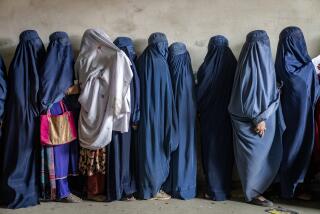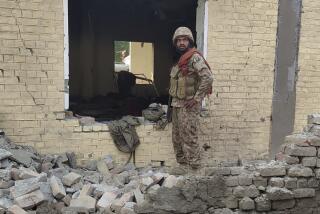Taliban militants stay in control near Pakistan capital
Emboldened Taliban fighters imposed control over towns and villages closer to Islamabad on Thursday, raising alarm among foreign governments and many in Pakistan that authorities are ceding swaths of the country’s heart to Islamic hard-liners.
Authorities dispatched a small paramilitary force from the North-West Frontier Constabulary to the district of Buner, just 60 miles from the capital, where Taliban forces took control of much of the area this week.
But Pakistani news media said the Taliban repulsed the deployment, with unconfirmed reports saying at least one policeman had been killed.
Taliban fighters from the nearby Swat Valley have infiltrated the area, emboldened by a government-sanctioned peace deal allowing them to enforce Sharia, or Islamic law, in the onetime tourist paradise. Since entering Buner, the Taliban has reportedly set up checkpoints, begun patrolling roads and ordered barbershops to stop shaving beards.
In a meeting with tribal elders, Taliban militants agreed to lower their armed presence and not seek vengeance against residents who had resisted their arrival. But the militants said they would not withdraw from Buner.
“We will not leave the area,” a Taliban commander, Mufti Bashir, told local journalists.
The moves have prompted some of the roughly 1 million Buner residents to flee, and unsettled observers in Pakistan and abroad who fear the government lacks the will to impose its authority.
The government has tried to downplay the threat to its sovereignty. Prime Minister Yusaf Raza Gillani told reporters in Islamabad that the government would see to it that the peace agreement isn’t violated. “The government will not allow anyone to challenge the government,” he said in a statement.
But it was uncertain how much force the government was prepared to use. Thursday’s limited dispatch of frontier guards, not the army, suggested that Islamabad was still not primed for a fight.
The Obama administration for a second straight day expressed deep concern over the advances by militants and Islamabad’s failure to stop them.
“The news over the past several days is very disturbing,” White House Press Secretary Robert Gibbs said.
Defense Secretary Robert M. Gates called on Islamabad to take “appropriate actions” to stop the insurgents.
“We want to be helpful in any way we can,” he said. “But it is important that they recognize the real threats to their country.”
Supporters of the Swat deal, hammered out in February after two years of a bloody Islamist insurrection and signed into law by President Zardari just last week, had contended that it would secure peace and even divide militant factions. But any breathing room or disunity was apparently short-lived, if it ever existed.
The militants are “very organized,” said Ahmed Rashid, author of “Taliban: Militant Islam, Oil and Fundamentalism in Central Asia.” “They’re a faction of the main Taliban and they’re spreading out from Swat to different valleys.”
The Taliban’s rule in Swat has been characterized by the burning of girls’ schools, the killing and beating of officials who opposed its power, and punishment for unrelated men and women seen together in public.
On Thursday, militants attacked a truck terminal in the city of Peshawar, also in the northwest, and burned five tankers that were transporting fuel to North Atlantic Treaty Organization forces in Afghanistan.
A local police official said dozens of attackers set fire to the trucks with gasoline bombs and that security guards fled. The attackers escaped.
Analysts said they didn’t expect an immediate push by Taliban forces into Islamabad, saying it was more likely the militants would work to strengthen their grip in surrounding valleys.
In Pakistan’s parliament Thursday, many lawmakers blasted the Taliban for its brand of Islam and fretted over its growing clout.
“They are in Buner and coming toward the town of Haripur,” lawmaker Haider Abbas Rizvi told reporters outside parliament.
“The government needs to take urgent steps and counter their march toward the capital.”
Opposition lawmakers said Taliban militants were trying to impose their version of Sharia and divide the country along sectarian lines.
But Ilyas Bilour, a senator from North-West Frontier Province, where Swat and Buner are located, blamed inadequate security forces.
“The government should do something, as we have police that are weak and unable to stop the Taliban,” he said.
Pakistan has long focused much of its energy and resources on national security, with India traditionally seen as its main threat.
“Everyone and his dog knows this is not a military trained for counterinsurgency,” said Mosharraf Zaidi, a political analyst.
Nor is it clear that a political consensus will emerge any time soon on the need to wage a full-on fight against the militants, some of whom reportedly got started with the help of Pakistan’s security services.
“People have been waiting for Pakistan’s 9/11 moment,” Zaidi added. “But this isn’t America.”
The country is extremely diverse, with a huge range of dialects, languages and traditions, analysts said, making a unified view on something as emotive as fighting Islamic fundamentalism very difficult.
“There’s blame at India, Afghanistan, Russia -- basically everyone else,” author Rashid said. “The government has its head in the sand. It’s very bleak.”
Still, trying to win over urban areas filled with cosmopolitan middle-class residents presents a tougher prospect for the Taliban than grabbing and intimidating rural areas.
“You can’t possibly think the rest of the country, particularly the urban areas, is going to fall like a house of cards,” Zaidi said. “Ultimately I think the country will overcome this. But it’s going to get worse first.”
The U.S. State Department called for “very decisive and aggressive action” by Islamabad. Secretary of State Hillary Rodham Clinton, who a day earlier described the situation as an “existential threat,” said the administration was “deeply concerned by the increasing insurgency that is destabilizing Pakistan.”
Also Thursday, Richard C. Holbrooke, U.S. special envoy to Afghanistan and Pakistan, telephoned Pakistani President Asif Ali Zardari. A vague statement issued a few hours later said only that the two had discussed security issues and Zardari’s upcoming trip to the United States.
--
Zaidi is a special correspondent. Times staff writer Paul Richter in Washington contributed to this report.
More to Read
Start your day right
Sign up for Essential California for news, features and recommendations from the L.A. Times and beyond in your inbox six days a week.
You may occasionally receive promotional content from the Los Angeles Times.






